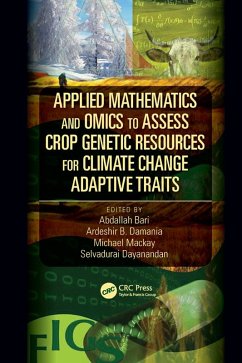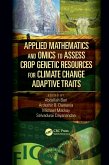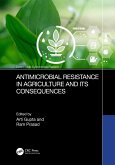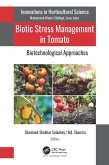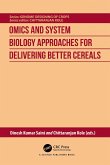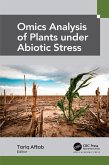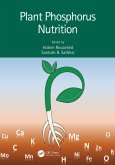Applied Mathematics and Omics to Assess Crop Genetic Resources for Climate Change Adaptive Traits (eBook, ePUB)
Redaktion: Bari, Abdallah; Dayanandan, Selvadurai; Mackay, Michael; Damania, Ardeshir B.


Alle Infos zum eBook verschenken

Applied Mathematics and Omics to Assess Crop Genetic Resources for Climate Change Adaptive Traits (eBook, ePUB)
Redaktion: Bari, Abdallah; Dayanandan, Selvadurai; Mackay, Michael; Damania, Ardeshir B.
- Format: ePub
- Merkliste
- Auf die Merkliste
- Bewerten Bewerten
- Teilen
- Produkt teilen
- Produkterinnerung
- Produkterinnerung

Hier können Sie sich einloggen

Bitte loggen Sie sich zunächst in Ihr Kundenkonto ein oder registrieren Sie sich bei bücher.de, um das eBook-Abo tolino select nutzen zu können.
This book focuses on using genetic resources to mitigate the effects of climate change and improve crop production. It emphasizes recent advances in mathematics and omics technologies while addressing issues related to the adaptation of crops to changing and fluctuating climatic conditions. With contributions from leading scientists and practitioners, it presents a broad view of the interplay of biodiversity in agriculture, discusses answers to some of the latest problems, and highlights ways to provide useful information to those who are working to address the effects of global warming and climate change.…mehr
- Geräte: eReader
- mit Kopierschutz
- eBook Hilfe
- Größe: 4.24MB
![Applied Mathematics and Omics to Assess Crop Genetic Resources for Climate Change Adaptive Traits (eBook, PDF) Applied Mathematics and Omics to Assess Crop Genetic Resources for Climate Change Adaptive Traits (eBook, PDF)]() Applied Mathematics and Omics to Assess Crop Genetic Resources for Climate Change Adaptive Traits (eBook, PDF)47,95 €
Applied Mathematics and Omics to Assess Crop Genetic Resources for Climate Change Adaptive Traits (eBook, PDF)47,95 €![Antimicrobial Resistance in Agriculture and its Consequences (eBook, ePUB) Antimicrobial Resistance in Agriculture and its Consequences (eBook, ePUB)]() Antimicrobial Resistance in Agriculture and its Consequences (eBook, ePUB)52,95 €
Antimicrobial Resistance in Agriculture and its Consequences (eBook, ePUB)52,95 €![Advances in Plant Disease Management (eBook, ePUB) Advances in Plant Disease Management (eBook, ePUB)]() Advances in Plant Disease Management (eBook, ePUB)52,95 €
Advances in Plant Disease Management (eBook, ePUB)52,95 €![Biotic Stress Management in Tomato (eBook, ePUB) Biotic Stress Management in Tomato (eBook, ePUB)]() Biotic Stress Management in Tomato (eBook, ePUB)145,95 €
Biotic Stress Management in Tomato (eBook, ePUB)145,95 €![Omics and System Biology Approaches for Delivering Better Cereals (eBook, ePUB) Omics and System Biology Approaches for Delivering Better Cereals (eBook, ePUB)]() Omics and System Biology Approaches for Delivering Better Cereals (eBook, ePUB)52,95 €
Omics and System Biology Approaches for Delivering Better Cereals (eBook, ePUB)52,95 €![Omics Analysis of Plants under Abiotic Stress (eBook, ePUB) Omics Analysis of Plants under Abiotic Stress (eBook, ePUB)]() Omics Analysis of Plants under Abiotic Stress (eBook, ePUB)108,95 €
Omics Analysis of Plants under Abiotic Stress (eBook, ePUB)108,95 €![Plant Phosphorus Nutrition (eBook, ePUB) Plant Phosphorus Nutrition (eBook, ePUB)]() Plant Phosphorus Nutrition (eBook, ePUB)52,95 €
Plant Phosphorus Nutrition (eBook, ePUB)52,95 €-
-
-
Dieser Download kann aus rechtlichen Gründen nur mit Rechnungsadresse in A, B, BG, CY, CZ, D, DK, EW, E, FIN, F, GR, HR, H, IRL, I, LT, L, LR, M, NL, PL, P, R, S, SLO, SK ausgeliefert werden.
- Produktdetails
- Verlag: Taylor & Francis eBooks
- Seitenzahl: 306
- Erscheinungstermin: 3. September 2018
- Englisch
- ISBN-13: 9781315359991
- Artikelnr.: 54782077
- Verlag: Taylor & Francis eBooks
- Seitenzahl: 306
- Erscheinungstermin: 3. September 2018
- Englisch
- ISBN-13: 9781315359991
- Artikelnr.: 54782077
- Herstellerkennzeichnung Die Herstellerinformationen sind derzeit nicht verfügbar.
Change and Dryland Systems. Plant Genetic Resources and Climate Change:
Stakeholder Perspectives from the Nordic and Arctic Regions. Adaptation of
Farmers to Climate Change: A Systems Approach to Cereal Production in
Benslimane Region, Morocco. Assessment of the Demand-Supply Match for
Agricultural Innovations in Africa. POTENTIAL OF USING GENETIC RESOURCES
AND BIODIVERSITY TO ADAPT TO AND MITIGATE CLIMATE CHANGE. Exploitation of
Genetic Resources to Sustain Agriculture in the Face of Climate Change with
Special Reference to Wheat. Utilizing the Diversity of Wild Soybeans in
China for Accelerating Soybean Breeding in the Genome Era. Adaptation of
Potato (Solanum tuberosum) and Tomato (S. lycopersicum) to Climate Change.
Barley Genetic Resources for Climate-Change Adaptation: Searching for
Heat-Tolerant Traits through Rapid Evaluation of Subsets. Fruit Genetic
Resources Facing Increasing Climate Uncertainty. APPLIED MATHEMATICS
(UNLOCKING THE POTENTIAL OF MATHEMATICAL CONCEPTUAL FRAMEWORKS). Applied
Mathematics in Genetic Resources: Toward a Synergistic Approach Combining
Innovations with Theoretical Aspects. Power Transformations: Application
for Symmetrizing the Distribution of Sample Coefficient of Variation from
Inverse Gaussian Populations. Toward More Effective Discovery and
Deployment of Novel Plant Genetic Variation: Reflection and Future
Directions. Identifying Climate Patterns during the Crop-Growing Cycle from
30 Years of CIMMYT Elite Spring Wheat International Yield Trials. Assessing
Plant Genetic Resources for Climate-Change Adaptive Traits: Heat Traits.
Plant Genetic Diversity: Statistical Methods for Analyzing Distribution and
Diversity of Species. APPLIED OMICS TECHNOLOGIES. Exploiting Germplasm
Resources for Climate-Change Adaptation in Faba Bean. Developing
Climate-Change Adaptive Crops to Sustain Agriculture in Dryland Systems
through Applied Mathematics and Genomics. Toward the Rapid Domestication of
Perennial Grains: Developing Genetic and Genomic Resources for Intermediate
Wheatgrass. Traits for Testing, Screening, and Improving Salt Tolerance of
Durum Wheat Genetic Resources. Gene Flow as a Source of Adaptation of Durum
Wheat to Changing Conditions Including Climate Change: Double Gradient
Selection Technique. Addressing Diversity of Ethiopian Durum Wheat Landrace
Populations Using Microsatellite Markers.
Change and Dryland Systems. Plant Genetic Resources and Climate Change:
Stakeholder Perspectives from the Nordic and Arctic Regions. Adaptation of
Farmers to Climate Change: A Systems Approach to Cereal Production in
Benslimane Region, Morocco. Assessment of the Demand-Supply Match for
Agricultural Innovations in Africa. POTENTIAL OF USING GENETIC RESOURCES
AND BIODIVERSITY TO ADAPT TO AND MITIGATE CLIMATE CHANGE. Exploitation of
Genetic Resources to Sustain Agriculture in the Face of Climate Change with
Special Reference to Wheat. Utilizing the Diversity of Wild Soybeans in
China for Accelerating Soybean Breeding in the Genome Era. Adaptation of
Potato (Solanum tuberosum) and Tomato (S. lycopersicum) to Climate Change.
Barley Genetic Resources for Climate-Change Adaptation: Searching for
Heat-Tolerant Traits through Rapid Evaluation of Subsets. Fruit Genetic
Resources Facing Increasing Climate Uncertainty. APPLIED MATHEMATICS
(UNLOCKING THE POTENTIAL OF MATHEMATICAL CONCEPTUAL FRAMEWORKS). Applied
Mathematics in Genetic Resources: Toward a Synergistic Approach Combining
Innovations with Theoretical Aspects. Power Transformations: Application
for Symmetrizing the Distribution of Sample Coefficient of Variation from
Inverse Gaussian Populations. Toward More Effective Discovery and
Deployment of Novel Plant Genetic Variation: Reflection and Future
Directions. Identifying Climate Patterns during the Crop-Growing Cycle from
30 Years of CIMMYT Elite Spring Wheat International Yield Trials. Assessing
Plant Genetic Resources for Climate-Change Adaptive Traits: Heat Traits.
Plant Genetic Diversity: Statistical Methods for Analyzing Distribution and
Diversity of Species. APPLIED OMICS TECHNOLOGIES. Exploiting Germplasm
Resources for Climate-Change Adaptation in Faba Bean. Developing
Climate-Change Adaptive Crops to Sustain Agriculture in Dryland Systems
through Applied Mathematics and Genomics. Toward the Rapid Domestication of
Perennial Grains: Developing Genetic and Genomic Resources for Intermediate
Wheatgrass. Traits for Testing, Screening, and Improving Salt Tolerance of
Durum Wheat Genetic Resources. Gene Flow as a Source of Adaptation of Durum
Wheat to Changing Conditions Including Climate Change: Double Gradient
Selection Technique. Addressing Diversity of Ethiopian Durum Wheat Landrace
Populations Using Microsatellite Markers.
